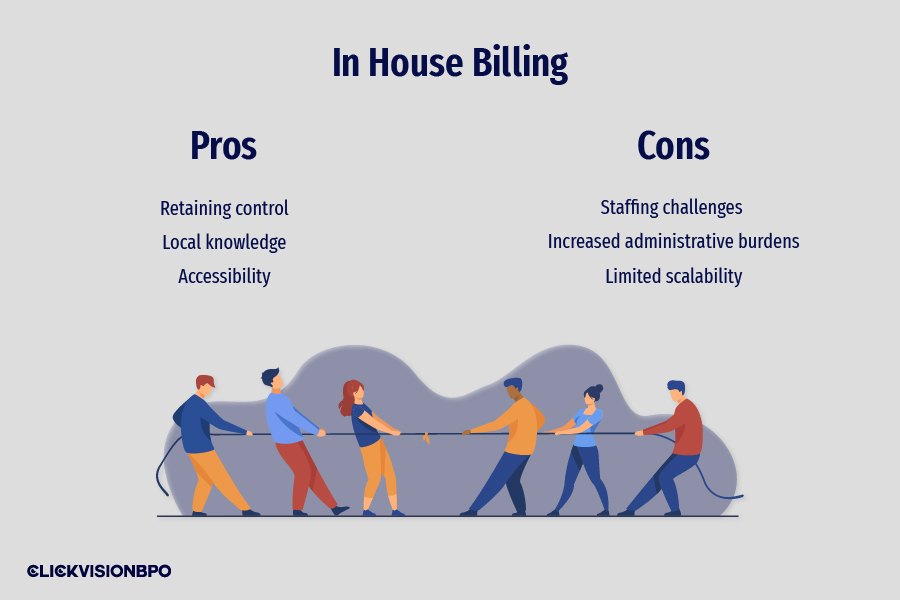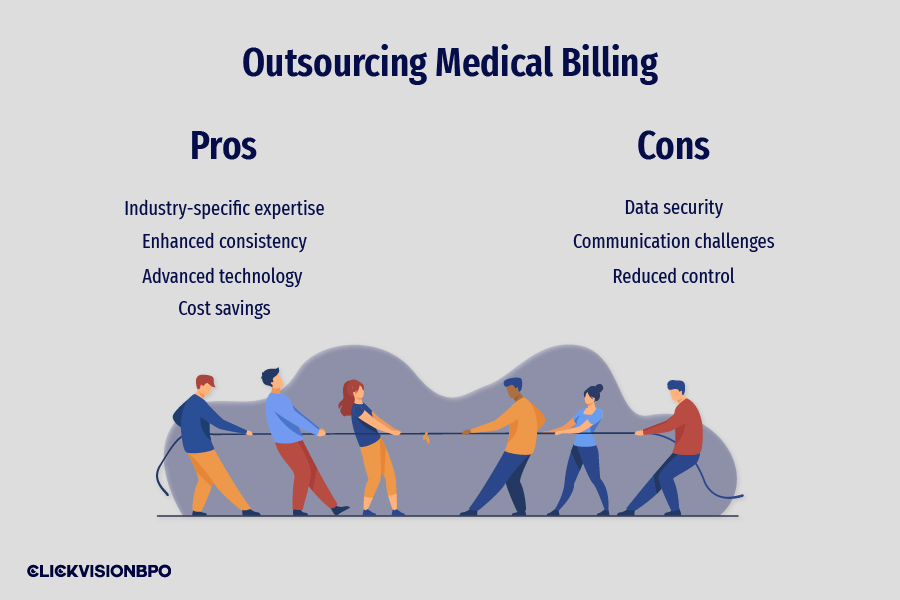Medical billing is one of the fundamental aspects of every healthcare organization, serving as a means of sending and following up on claims associated with health insurance companies to receive payment for your healthcare services. Efficient billing practices are vital for preserving the health of your company and ensuring smooth operations and efficiency. However, as a healthcare provider, you’re faced with the challenging decision of choosing between in house billing vs. outsourcing.
In this article, we’ll provide you with everything you need to know and gain insights to help you make the right choice and ensure the success of your organization. Delve into the challenges and advantages of in house billing and outsourcing.
In House Billing vs. Outsourcing
Medical billing is certainly no easy task. It’s the process of submitting and following up on claims for the purpose of obtaining payment for medical services provided by your health institution. This includes handling:
- Claims filings
- Claim submissions
- Payment postings
- Charge/coding review
- Fixing and reprocessing claim rejections
- Accounts receivable management
- Appeal denials
- Patient payments and statement call center
- Collaborating with insurance companies and other payers
Experienced and knowledgeable billing teams can significantly impact your company’s revenue performance as well as financial sustainability and flexibility. But, when it comes to billing, companies can choose between two methods: managing the process internally or outsourcing it to an external party. In house billing refers to the practice of having your own team manage all the aspects of billing. In contrast, outsourcing involves collaborating with an external third-party billing company to handle the job.
But which one is better?
Since both options are faced with certain pros and cons, it’s critical to carefully weigh the advantages and challenges when contemplating between in house vs. outsourcing services. When choosing between the two, consider factors such as organizational size, resources, and strategic goals. With these goals in mind you ensure an informed decision and determine the right method that aligns with your specific needs and priorities.
In House Billing vs. Outsourcing Pros and Cons
Now that we’ve covered the basics, here are the pros and cons of in house billing and outsourcing to help you make the right choice, maximizing the benefits and mitigating the challenges associated with either method.
Advantages of In House Billing
Retaining control
In house medical billing allows you to have direct control over the billing operation, especially when trusted, long-term employees are taking on medical coding and RCM duties. With an internal billing staff, it’s easier to track and observe every step of the billing process, gaining the flexibility to adapt and tailor strategies. By having in house billing services, you get to try new methods, launch initiatives, swiftly address specific needs, and implement changing regulations. This way, you can customize your billing practices and directly implement process changes and improvements whenever necessary without relying on an external vendor.
Local knowledge
One distinctive benefit that in house billing offers is associated with local knowledge, enabling you to have a nuanced understanding of the regional market and community. You’ll have unique insights into the local billing regulations, payer intricacies, and specific community necessities, contributing to the accuracy of the billing processes and improving compliance with regional healthcare policies.
Accessibility
The accessibility of your in house billing department is another major advantage. Staff members have direct and immediate access to financial data, billing records, and the entire billing process, allowing them to swiftly respond and address any problems that might arise. This accessibility enables a more hands-on approach and timely adjustments to managing billing intricacies.
Disadvantages of In House Billing
Although in house billing in healthcare has its advantages, it’s equally essential to acknowledge the potential challenges you might face. Exploring these drawbacks gives you a better understanding of this approach and allows you to thoroughly consider every aspect and make an informed decision:
Staffing challenges
Some of the staffing challenges healthcare institutes face include the need to cover staff absences, lack of specialization, and insufficient skills and experience when it comes to evolving billing regulations, all of which can impact billing performance and revenues.
Increased administrative burdens
Heightened administrative burdens are common with in house billing teams, further contributing to complexities. The cost associated with training and retaining skilled personnel, maintaining software, and staying current with evolving regulations can stain resources and impact the health of your company.
Limited scalability
As your company grows, the volume of healthcare transactions increases, demanding an expansion in your billing staff. However, this may pose some challenges in expanding the capacity since it adds overhead costs, potentially leading to delays in processing and inefficiencies. In house teams can only scale so far before outsourcing comes in to manage large claim volumes more efficiently.

Advantages of Outsourcing Medical Billing
Industry-specific expertise
Outsourcing medical billing operations to specialists who only handle medical bills ensures a specialized approach to claims and operations, handled with a greater degree of expertise. Since our teams in CLICKVISION BPO offer specialized knowledge and experience in medical billing, we are equipped to navigate complex billing regulations and insurance requirements, delivering solutions tailored perfectly to your needs.
While in house employees may be bound to additional responsibilities beyond billing, our teams are dedicated to the given tasks, spending their spare time researching new billing technologies and regulations and fully dedicating themselves to the craft. This unique benefit of specific expertise and knowledge can help you avoid costly mistakes and maximize your reimbursement rates.
Enhanced consistency
Another major advantage of outsourcing medical billing involves staffing consistency. Our teams are dedicated to staying abreast of ever-changing regulations and industry standards all year round. Outsourcing these tasks to an external provider guarantees timely and quality results while also establishing contingency plans in case of absence from work.
Medical organizations can confidently streamline their operations while being assured they will receive their payments regardless of whether someone is off duty. By leveraging specialized knowledge and advanced technology, we ensure a streamlined, consistent, and optimal billing process, reducing errors and improving accuracy and precision.
Advanced technology
When outsourcing medical billing operations, you have an opportunity to utilize many valuable resources, including access to advanced technology and tools to manage billing effectively and provide significant performance gains. This includes various billing software, payment processing tools, and security measures to protect client information, offering improvements in data mining, patient statement quality, claim submissions, and even coding and claims follow-up.
Cost savings
Outsourcing offers revolutionary solutions for medical businesses struggling with limited resources. While delivering optimal efficiency and exceptional expertise, this practice has the unique benefit of reducing costs and increasing financial sustainability without compromising quality. Some of the ways outsourcing helps reduce company costs include:
- Cost savings through labor arbitrage
- Reduction in operational costs
- Decreased office space requirements
- Lower equipment and utility expenses
- No training cost
With the cost-effective advantage, companies stand to obtain significant benefits to financial gains, including financial flexibility, and profitability improvements. Expansion opportunities, innovations, and enhancement of the company’s competitive edge shouldn’t be overlooked.
Disadvantages of Outsourcing Medical Billing
Although this method offers a revolutionary approach to medical billing with significant benefits, it does pose some drawbacks. It’s essential to consider the following disadvantages and carefully determine which method is the right one for your company:
Data security
Outsourcing medical billing operations involves sharing sensitive and personal details with external companies, such as patient data and company information. This poses some security threats, which can be a cause of concern to some companies.
Communication challenges
Communication challenges are a common concern when collaborating with a third-party provider. This could be especially troublesome when there are cultural and language barriers.
Reduced control
Hiring an external company usually suggests that you’d need to give up some control over the billing process. Although this may concern some companies, choosing the right company can mitigate these concerns, leading to a collaborative partnership.

Conclusion
In conclusion, medical billing is an essential part of healthcare administration, requiring specialized knowledge, experience, and proper technology. As a medical institution, you have two options to execute this task–by outsourcing or managing the process internally.
While in house billing offers greater control, accessibility, and customization, it demands significant investments in personnel training and operational equipment. On the other hand, outsourcing is a new approach delivering specialized expertise, utilization of advanced technology, and great cost savings. However, it relinquishes some control and poses communication barriers.
Understanding the differences between in house billing vs. outsourcing can significantly influence operational efficiency, financial sustainability, and overall outcomes. It’s critical to make informed decisions in this regard, which will ultimately optimize compliance and contribute to the overall success of your healthcare institution.

With a strong background in the marketing industry and healthcare leadership roles, Filip is responsible for CLICKVISIONBPO’s sales strategies and onboarding new clients. With a passion for sharing insights gained from his experience, he also shares valuable knowledge through industry related articles.
